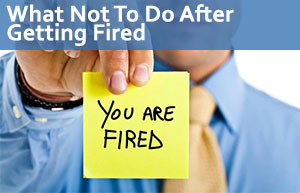SPEAK WITH A LAWYER TODAY
Wrongful Termination Lawyer – Do I Have a Case?
As an employment law firm specializing in wrongful termination cases, we frequently receive questions about illegal firings. Some common concerns include:
Losing a job can be a life-altering experience, causing stress due to the sudden loss of income that covers food, rent/mortgage, loans, and family expenses.
Although California is an “at-will” state, meaning employers can terminate employees for any reason or no reason at all, the dismissal must still comply with federal, state, and local laws. If an employer fires an employee for reasons that violate any of these laws, it is considered wrongful termination.
If you suspect your firing was wrongful, you may have the right to file a lawsuit. Here’s what you need to know about wrongful termination.
If your attorney is not maximizing your case value, contact our firm for a free second opinion.
Was My Firing Illegal?

Breach of Contract
If your employment contract outlines specific promises regarding job security, termination conditions, or growth opportunities, your employer may have violated that agreement. A contract that states you can only be terminated for “good cause” strengthens your case against an at-will employment defense.
Implied Promises
Even if you never signed a written contract, an implied employment contract may exist based on verbal statements, company policies, or past employment practices. Courts evaluate several factors to determine whether an implied contract was breached, such as:
- Length of employment
- Consistent positive performance reviews
- Verbal assurances of continued employment
- Employer’s deviation from usual termination practices
- Promises of long-term job security
Breaches of Fair Dealing
Employers have a duty to act in good faith and deal fairly with employees. Violations may include:
- Firing employees to avoid paying commissions or benefits
- Misleading employees about salary increases or promotions
- Fabricating reasons for termination to replace employees with lower-paid workers
- Transferring employees to undesirable positions to force resignation
- Failing to disclose job risks, such as dangerous work conditions
Breaking Public Policy
Employers cannot fire employees for reasons that violate public policy. Wrongful termination lawsuits may arise when an employee is fired for:
- Filing discrimination or harassment complaints
- Taking jury duty leave
- Voting in elections
- Serving in the military
- Exercising a legally protected right
Discrimination
Employers cannot terminate employees based on legally protected characteristics, including:
- Pregnancy
- Race
- Disability
- Age
- Gender
- Sexual orientation
If your termination involved discrimination, our wrongful termination attorneys can take legal action against your employer.
Retaliation
Employers cannot retaliate against employees for engaging in legally protected activities. Wrongful termination due to retaliation includes firing employees for:
- Reporting workplace harassment
- Filing HR complaints
- Complaining about unpaid overtime or wage violations
- Reporting unsafe working conditions
- Blowing the whistle on illegal business practices
Whistleblower Protection
Employees who report illegal business activities, regulatory violations, or public safety concerns are protected under whistleblower laws. Employers who terminate whistleblowers can be held accountable under state and federal laws.
Can I Sue My Former Employer?
Before filing a wrongful termination lawsuit, you must first submit a claim with the Equal Employment Opportunity Commission (EEOC) or the California Department of Fair Employment and Housing (DFEH). Depending on the nature of your case, strict filing deadlines (statutes of limitations) apply:
- Discrimination, retaliation, or harassment cases: 12 months to file.
- EEOC right-to-sue letter: 90-300 days to sue after receiving the letter.
- Termination violating public policy: 2 years to file.
- Breach of contract claims: 2 years for oral contracts, 4 years for written contracts.
Do I Have a Wrongful Termination Case?
Determining whether you have a valid wrongful termination case requires an experienced employment attorney. At the California Labor Law Employment Attorneys Group, we offer:
- Free consultation: We will evaluate your case and provide guidance.
- Zero fee guarantee: You pay nothing unless we win your case.
Free Consultation and Zero Fee Guarantee
Our employment lawyers are experienced in handling wrongful termination cases across California. The California Employment Attorneys Group operates on a contingency fee basis—no upfront fees, and we only get paid if we win your case.
Client Review
“I am so grateful to have found the California Labor Law Employment Attorneys Group. Igor provided the best possible outcome for my termination agreement. Every point he recommended was granted. I can’t say enough about how he looked out for all my interests with professionalism and care.”
– Tiffany Reynolds
Client Review
““I am so grateful to have found the California Labor Law Employment Attorneys Group. The advice of Igor provided the best possible outcome with my termination agreement. Every point that he recommended was granted. I couldn’t have asked for more. Igor was the second Employment Lawyer I worked with during this very stressful time and my only regret is that I didn’t find him first. I can’t say enough about how he looked out for all of my interests, him sound professional advice and a very caring and uplifting positive manner.”
– Tiffany Reynolds

100% FREE CASE CONSULTATION

OUR Guarantee
Pay NO FEES until we win your Employment case.

Client Review
California Labor Law Employment Attorneys Group
5 out of 5
This can be an ugly world and it is nice knowing lawyers such as Daniel to help people right a wrong when they have suffered at the hands of their employer. Daniel is one of the good guys out there and I strongly recommend his skills as an employment lawyer.
– Hoagland Stubbs